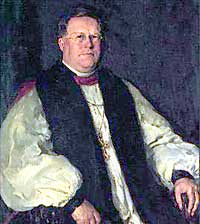Now, this game is actually an adaptation of another game. My friend, Nathan Carlson, a member of St. Thomas down in Birmingham, taught me his game a few years ago. Nathan is a teacher and soccer coach at Homewood High School. He’s creative, he’s funny, and he’s caring. The game he plays is called, “Guess What’s Underneath My Shirt!” As baffling as it might be, the game is simply played by guessing what is underneath Nathan’s shirt. He might hide a toaster oven and the objection of the game is to guess toaster oven. Maybe you get to keep the object, but probably you just get the satisfaction of knowing you were right.
Well, this morning I want to play the Christmas version of this game entitled, “Guess the Present.” I imagine you might already be pretty good at this. We all tend to look at the presents underneath the Christmas tree and we make a guess at what’s underneath the wrapping paper. Well, the game is played in much the same way. I will hold something up and you guess what is held within the packaging. If you guess correctly, then you have the satisfaction of knowing you were right.
Round:
1. Lamp shade
2. Clock
3. Mystery Present
In this third package it could really be anything. It just looks like a box. Who knows what it could be inside this mystery present? While we are thinking about what is held within this paper, I wonder why it is that we give one another presents at this time of year. Why do we give gifts at Christmas time?
Perhaps it has something to do with St. Nicholas. He was the 4th Century Christian bishop of Myra who supposedly would go around to poor families and pay their daughters’ dowries leaving money and sometimes food in a family member’s shoes that would have been left on the outside of the house. Some still celebrate the tradition in early December as they put their shoes out and wait for presents to fill them up. Actually if you leave out a stocking you are in some way celebrating St. Nicholas. Still I don’t know if this is the real reason why we give each other presents now. I wonder what is in the mystery present.
But why do we give each other presents? Maybe it is because we like each other. We appreciate one another, and we want to show that gratitude in giving one another a gift. Perhaps… Really, I have to know what is in this mystery box! If it could be anything, what do you wish it is? A picture of a beloved relative? A gift card? Keys to a new car? A check for a million dollars? Alright, I cannot stand it anymore… I am going to open this present!
There is nothing inside, just some gold paper. I wonder why there’s nothing in it. Sometimes we cannot sense with our sensory perception the gifts we are given. We may not be able to see, touch, taste, smell, or hear a gift, but that does not mean it is not given to us. I believe this is the case with the gift that we receive in today’s gospel.
The good news of John opens with a mysterious song that focuses upon the Word. “In the beginning was the Word, and the Word was with God, and the word was God. He was in the beginning with God. All things came into being through him, and without him not one thing came into being. What has come into being in him was life, and the life was the light of all people. The light shines in the darkness, and the darkness comprehend it not.”
God, in His infinite abundance, goodness, and love created all things by speaking things into being through the Word. All of this that we see, touch, taste, smell, and hear has been made and made good through the Word of God. Yet, like a mysterious present that we cannot figure out, sometimes we do not understand this present that we have been handed. “He was in the world and the world came into being through him; yet the world did not know him,” John says. I believe that we give each other gifts at this time of year to take part in God’s abundant gift giving. We attempt to show one another our appreciation by participating in God’s gifting.
“The Word became flesh and dwelt among us, and we have seen his glory, the glory as of a father’s only son, full of grace and truth.” The gift that we have been given is that the Word became flesh and dwelt among us. When God came into the world through the Word of God we were given the clearest gift of God’s abundant love for us. Through God becoming incarnate all of creation and we ourselves were made holy vicariously.
God’s Word also brought true light into the world. “The true light, which enlightens everyone, was coming into the world.” This light was brought into the world through the Word of God. It enlightens us all. In this the darkest time of year for us in the northern hemisphere we are reminded that the true light enlightens us all. We have this light within us. Each of us has this light within us. The Christ light burns inside.
So as we go forth from here celebrating Christmas, celebrating the Word of God made flesh and dwelling with us, let us also take with us the light of Christ. When we meet our family, our friends, and our neighbors that light burns within us, and it burns within them as well. Remember that all whom we meet have been made holy by God’s coming to be with us. Remember that God has given us all the gift of coming to be with us. Remember that we all possess Christ’s light within us. Amen.




